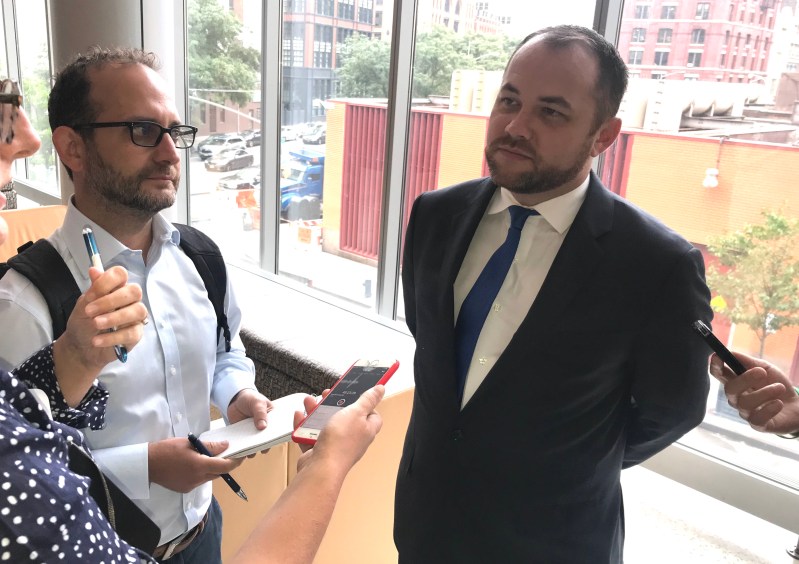Corey Johnson Says City May Do Congestion Pricing Without State OK
Speaker, like many, is frustrated that the legislature and the governor have not passed a measure to both reduce traffic and fund the subway.

He did it with speed cameras and now Council Speaker Corey Johnson says he’s looking into having the city create its own congestion pricing tolls without waiting for state authority.
Johnson, speaking at a New York Law School breakfast on Friday, dropped the bombshell during a talk that almost entirely focused on his support for congestion pricing to fix mass transit. He expanded on his home rule balloon with reporters afterwards.
“We are looking at our home rule authority, just like we looked at our home rule authority on the city speed camera program,” Johnson said. “And we found out that … there was a way for us to actually have a city-run speed camera program. We came up with a jury-rigged way to make it happen. It would be much easier if the state legislature passed a full congestion pricing plan … but if there is inaction we have to look at our powers.”
Johnson did not speculate on the shape a city-run toll scheme would take, nor did he say which of the existing state proposals — one by Governor Cuomo’s FixNYC panel, and the other known as MoveNY, both of which would use congestion pricing revenue for transit.
The bottom line, Johnson said, is that “without congestion pricing, we don’t have a realistic path forward for mass transit.
“Albany needs to step up either by appropriating more money for the MTA in the state budget or allowing New York City to create new revenue streams, whether that be congestion pricing or a millionaire’s tax or reinstating the commuter tax,” he added. “But they are not letting that happen for us.”
And it’s clear that Johnson doesn’t want wait, telling reporters that he started looking at seizing broader powers after the legislature adjourned in July without taking up the issue.
“As the leader of a legislative body, you always want to figure out ways that you can use what you believe is your charter-mandated power and state-granted authority on things,” he said. The successful bid to restore speed cameras, he added, “made us take a more serious look at our home rule authority.”
Does the city have that authority?
Yes, one of the city’s top legal minds argued last year.
In 1956, “the Legislature … bestowed a new power on the New York City Council to impose tolls,” scholars Frederick A.O. Schwarz Jr. of the Brennan Center, Hofstra Law School Dean Eric Lane and NYU Law Professor Roderick Hills, Jr. wrote.

But City Hall doesn’t necessarily think it has the power.
In early 2017, DOT Commissioner Polly Trottenberg said at a hearing, “Many attorneys over a number of administrations have looked at this question very carefully [and] determined that the city doesn’t have the legal authority, that we need to get that authority from the state.”
But those legal eagles once said the same thing about speed cameras.
“There has been no publicly reasoned defense of such abdication of city power at all, just bland assertions by city officials that unnamed city lawyers have decided for reasons unknown that the city has no powers whatsoever,” Schwarz and company wrote shortly after. (Officially, City Hall declined to comment for this story.)
Left unsaid — at least for today — is whether a Johnson-pushed congestion pricing plan could even pass the City Council, which is dominated by outer-borough interests, and whose membership almost entirely drives everywhere.
Assemblyman Dick Gottfried (D-Manhattan) alluded to that problem when I asked him whether a state congestion pricing plan could even pass.
“Let’s remember that the overwhelmingly Democratic State Assembly wouldn’t touch it so far, so we have a major uphill fight with opposition from the New York City suburbs and the other boroughs,” said Gottfried, who supports congestion pricing and doesn’t think outer borough interests should even need to be persuaded.
“Their constituents who take mass transit far outnumber their constituents who drive,” Gottfried said. “But a lot of my colleagues [in Albany] are car drivers.”
Johnson also floated the idea of city control of the subway system itself — not a new notion, but one that is being heard more frequently as the governor and the mayor bicker over responsibility for running the $16-billion system that is controlled by the state but, technically, owned by the city.
“[City control] is a separate issue,” Johnson said. “We cannot do that on our own. … That would be the state legislature breaking New York City Transit off from the MTA umbrella. I don’t know why they want the headache honestly. They should want to give it to us. They could then say, ‘It’s the city’s fault.'”
I asked Johnson how the city could pay for its own “NYC Subway System” without the toll revenue from the state-run bridges or other contributions, but he said he wasn’t cutting off his funding stream to spite his constituents.
“I didn’t say we wouldn’t take their money,” he said. “We still take their money on the school system and we have mayoral control. … But it’s a conversation we need to have. We need to control our destiny on the subway like we do with our schools.”





